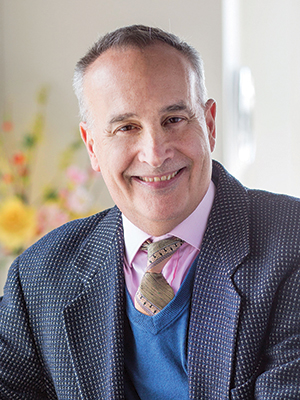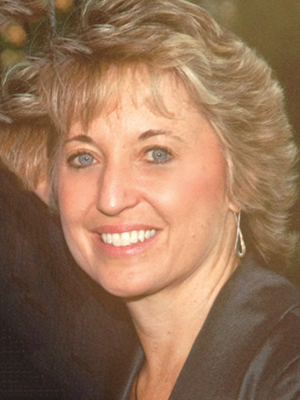My mother has decided to stop her treatment for metastatic cancer. My siblings and I think she should continue. What can we do?

Mellar Davis, Oncologist and Palliative Medicine Physician at the Cleveland Clinic in Ohio. Photo courtesy of Cleveland Clinic in Ohio
MELLAR DAVIS: When family members disagree on decisions to stop treatment, the conflict often stems from poor communication. Sometimes parents keep information about a poor prognosis from family members to try to protect them. Other times, family members may unrealistically think the cancer patient has a more favorable prognosis.
My first recommendation is to call a family meeting, including your mother, siblings and perhaps others who are intimately involved in your mother’s life, such as another parent, spouse or caregiver. You might find it helpful to include a member of your mother’s health care team as well. Find someone impartial to facilitate the conversation. This could be a trained professional, but a trusted friend will do. Start by asking family members to share their understanding of the situation and their concerns, allowing everyone to express their views.
It’s critical that you come to a common understanding of the prognosis, treatment options and goals of care—and that you and your siblings learn what your mother hopes to do with what remains of her life. For example, recently, I spoke with an 80-year-old who has recurrent esophageal cancer. He made it clear that he has accomplished everything he wants in life. He didn’t want to undergo therapy that might extend his life by only a few months.
In many cases, having a conversation can lead to a resolution. There may be tears. You may find that you didn’t realize the cancer was so far along. Or you might still feel disappointed by your mother’s decision, which is ultimately hers to make. Explore your feelings and express the reasons for your position. Allowing everyone to have a voice can help you come to accept the decision.
Some people can live for quite some time with metastatic disease, but it’s a good idea to be proactive. Open discussions about what a loved one would want done under particular circumstances are easier before you find yourself in the midst of a crisis. Advance directives or the Physician Orders for Life Sustaining Treatment (POLST) Paradigm can serve as useful springboards for exploring what your mother wants as she approaches the end of her life.
ENDING TREATMENT // Choosing Wisely offers advice on end-of-life care for advanced cancer patients. // The American Cancer Society provides guidance on what to do when cancer doesn’t go away. // POLST.org features videos that guide conversations with patients, loved ones and health care professionals for end-of-life planning.
I felt upbeat during treatment, but now that my cancer is in remission, I can’t stop feeling anxious and sad. What should I do?

William Goeren, Director of Clinical Programs at CancerCare in New York City. Photo courtesy of CancerCare
WILLIAM GOEREN: People may not expect to feel anxious or sad while their cancer is in remission, but these feelings are actually very common. After treatment, many people feel they are left in limbo, wondering “What’s next?”
People whose cancer has gone into remission frequently enter a period of watchful, anxious waiting. A lung cancer survivor of 17 years once told me that “waiting is the worst part of cancer.” A woman I worked with who had undergone treatment for advanced ovarian cancer said that, as much as she struggled physically through chemotherapy, she would rather be receiving chemo than not. People in treatment often feel as though they are actively fighting cancer. When they finish treatment and there is suddenly less for them to do, anxiety and panic can escalate.
Sometimes caregivers, medical support staff and friends offer congratulations when people have completed treatment. But survivors might not feel like celebrating, and that’s OK. There’s a difference between being relieved and being anxiety-free. They may be relieved treatment is over, but then they need to face the physical and psychological aftereffects.
The period after treatment is an active stage of the cancer experience. It’s important to first acknowledge feelings and emotions—which might include some combination of fear, anxiety, sadness or obsession with bodily sensations. As you approach this new phase and begin planning for the future mindfully as a cancer survivor, consider what you find meaningful or important in life. What helps you to feel calm and focused? What are your personal goals?
It can be helpful to seek support through survivorship support groups or individual counseling. While it’s great to talk to an experienced counselor or a social worker, sometimes talking to someone who has been there can make all the difference. Find another cancer survivor for peer counseling or support. Ask that person for advice in identifying coping mechanisms for living day to day after cancer.
Some people may find it helps to get involved in the cancer world in some way, perhaps as an advocate or volunteer. Others may choose to distance themselves from their cancer experience. People often say they need to find their new normal, and that’s true. After cancer, life will be different.
SURVIVOR STRESS // CancerCare offers a free online support group for people who have completed cancer treatment. // Cancer.Net provides tips and a podcast on dealing with the fear of recurrence. // The National Cancer Institute publishes a booklet to provide guidance for life after treatment, including information on receiving follow-up medical care and returning to work.
I have just been diagnosed with cancer. Should I consider a clinical trial?

Andrea Denicoff, Oncology Nurse Practitioner and Head of Clinical Trials Operations for the National Cancer Institute’s National Clinical Trials Network in Bethesda, Maryland. Photo courtesy of Andrea Denicoff
ANDREA DENICOFF: When you’ve just received a new cancer diagnosis, you may feel overwhelmed. You’ll need to understand what type of cancer you have and whether it is early or advanced. You’ll also need to explore your available treatment options. In most cases, your doctor will recommend an established treatment plan based on the standard of care. It’s a good idea to first understand those standard treatment options and then explore with your doctor whether your treatment might include a clinical trial.
You might consider a clinical trial for a number of reasons. In some cases, a promising, yet unproven, treatment approach might only be available through a clinical trial. Note, however, that you may only be able to participate in a clinical trial for an experimental new treatment after you no longer respond to standard treatments. On the other hand, signing up for clinical trials for certain types of cancers, such as pancreatic cancer, has almost become routine because standard treatments against pancreatic cancer haven’t been very successful. Your cancer diagnosis and prognosis will help determine the steps that are right for you.
Each clinical trial has specific eligibility requirements, including cancer type and stage, treatment history and age. Each clinical trial will also have its own risks and potential benefits that you’ll need to consider carefully. Keep in mind that clinical trials of experimental new treatments may be randomized, meaning that participants or their doctors will not be able to choose whether they will receive the new treatment or the standard one. You’ll have to decide if that uncertainty is something you are willing to accept.
Many patients who decide to participate in clinical trials for cancer treatment do so knowing that the new treatment approach may or may not benefit them. (In randomized trials, it is not known whether the new treatment will be better than the standard approach.) However, patients may feel they are advancing the understanding of cancer treatment for the benefit of others. Most of what we know about successful treatments is built on prior clinical trials. Patients willing to participate help move treatment forward.
EXPLORING CANCER TRIALS // Clinicaltrials.gov lists almost 17,000 open cancer-related clinical trials. // Dana-Farber Cancer Institute offers suggestions for deciding whether or not to enroll in a clinical trial. // The University of California, Davis, Comprehensive Cancer Center lists 10 things to know about clinical trials.
Cancer Today magazine is free to cancer patients, survivors and caregivers who live in the U.S. Subscribe here to receive four issues per year.




